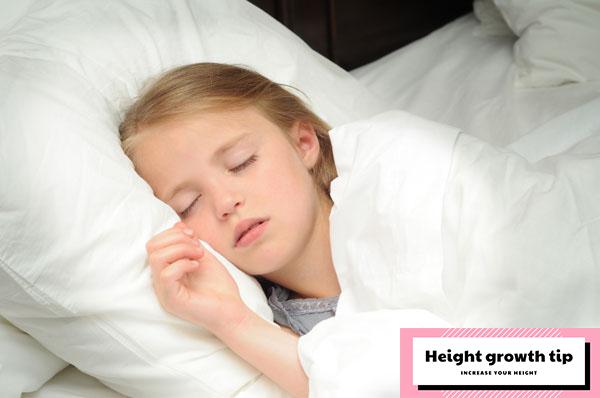In the hustle and bustle of our daily routines, amidst the endless to-do lists and responsibilities, it can be easy to overlook the importance of getting enough quality sleep. Yet, as we explore the realm of our well-being more deeply, it becomes increasingly evident that sleep is not merely a luxury, but a fundamental necessity. It is during those precious hours of slumber that our bodies rejuvenate, our minds reset, and our overall health recalibrates.
We are all familiar with the idea that a good night’s rest can do wonders for our cognitive function, emotional resilience, and physical health. But what if I were to tell you that your nightly sleep could hold the key to reaching new heights – quite literally?
At first, this may sound too good to be true. However, there is a fascinating connection between sleep and physical growth, particularly in relation to our bones and muscles. And here’s the kicker – it’s not just about getting enough sleep; it’s about understanding how the quality and duration of our sleep can impact our potential height.
Let us, then, delve into this intriguing correlation between sleep and stature, uncovering the science behind it and exploring how optimizing our sleep habits could potentially unlock our full growth potential. Prepare to embark on an eye-opening journey into the world of sleep and its profound implications for our overall health and well-being.
The Impact of Sleep on Height: Unveiling the Role of Slumber in Growth
It’s well known that sleep plays a crucial role in our physical development and overall height. This can be attributed to the way sleep influences the production of human growth hormone (HGH), a key regulator of growth. During the restorative phases of sleep, the pituitary gland releases HGH, which drives the growth of our bones, muscles, and other tissues. This is especially important during the tumultuous years of puberty when HGH levels are at their peak.
Of course, sleep is just one piece of the puzzle when it comes to growth and height. A balanced diet, regular exercise, and overall good health also contribute significantly. But the link between sleep and HGH production is undeniable.
Adequate sleep is particularly crucial for bone health and formation. While we rest, our bones undergo constant remodeling and growth. But sleep deprivation can disrupt this process, leading to weaker, more fragile bones and an increased risk of fractures. It also affects the production of melatonin, a hormone that plays a key role in maintaining bone density.
Another interesting aspect of the sleep-height connection is the way it impacts the intervertebral discs in the spine. During the day, these discs become compressed, causing us to be slightly shorter than our maximum height. But overnight, the discs expand back to their full size, restoring our stature.
In short, sleep emerges as a central factor in the complex symphony of growth, bone development, and overall physical well-being. Ensuring we get enough high-quality sleep should be a priority for anyone interested in reaching their full height potential and maintaining good health.

Does sleep help you get taller?
It’s a widely held belief that sleep can directly impact a person’s height, but the reality is a bit more nuanced. While sleep may not magically make you taller once you’ve reached your genetically determined height potential, it does play a crucial role in supporting overall growth and development, which can indirectly contribute to maximizing your height.
During the hours of sleep, our bodies work tirelessly, producing human growth hormone (HGH), a vital element for growth. HGH is primarily released during the deeper stages of sleep and acts as a natural growth booster, promoting the development of bones, muscles, and other essential tissues. Ensuring you get sufficient and quality sleep can guarantee the adequate production of HGH, laying the groundwork for optimal growth during childhood and adolescence.
Beyond HGH, sleep also exerts a significant influence on bone health. It’s during these restorative hours that bones experience proper formation, as they predominantly grow and regenerate mass while we sleep. The consequences of insufficient sleep can be detrimental to bone density, increasing the risk of brittle bones and fractures, which could potentially have long-term effects on your height.
It’s important to remember that while sleep is undoubtedly a vital factor in the growth equation, it’s not the sole determinant of your height. Genetics, nutrition, overall health, and other variables all play significant roles in shaping your stature. Therefore, if you aspire to reach your full height potential, it’s crucial to maximize your sleep and take comprehensive care of all the growth-promoting factors within your control.
What is the best time to sleep to grow taller?
The optimal time to sleep each night depends on the recommended time frame for your specific age group.
| Age | Recommended amount of sleep |
| 0-3 months | Total 14-17 hours |
| 4-12 months | Total 12-16 hours |
| 1-2 years | Total 11-14 hours |
| 3-5 years | Total 10-13 hours |
| 9-12 years | Total 9-12 hours |
| 13-18 years | Total 8-10 hours |
| 18-60 years | At least 7 hours every night |
| 61-64 years | 7-9 hours every night |
| Up to 65 years | 7-8 hours every night |
To determine the best bedtime for your schedule, you can start by figuring out what time you need to wake up in the morning. From there, you can count backwards based on the recommended amount of sleep for your age group. For instance, if you need to wake up at 6 am and require eight hours of sleep, you should aim to go to bed before 10 pm.
How to sleep better?
While some may believe that sleep directly impacts one’s height, the reality is more nuanced. While sleep alone cannot magically make you taller once you’ve reached your genetically determined height potential, it does play a crucial role in supporting overall growth and development, which can indirectly contribute to maximizing your height potential.
During those precious hours of slumber, our bodies are hard at work, producing human growth hormone (HGH), a vital element in the growth equation, primarily released during the deeper stages of sleep. HGH is like nature’s growth booster, promoting the development of bones, muscles, and other essential tissues. Ensuring you get sufficient and quality sleep can guarantee the adequate production of HGH, laying the foundation for optimal growth during childhood and adolescence.
Beyond HGH, sleep also exerts a significant influence on bone health. It is during these restorative hours that bones experience proper formation, as they predominantly grow and regenerate mass while we sleep. The consequences of insufficient sleep can be detrimental to bone density, increasing the risk of brittle bones and fractures, which could potentially have long-term effects on your height.
Of course, it’s important to remember that while sleep is undeniably a vital factor in the growth equation, it is not the sole determinant of your height destiny. Genetics, nutrition, overall health, and other variables all play significant roles in shaping your stature. Therefore, if you aspire to reach your full height potential, it is crucial to maximize your sleep and take comprehensive care of all the growth-promoting factors within your control.

What happens if you don’t get enough sleep?
Getting the right amount of sleep is crucial for your health and well-being. When you don’t get enough shut-eye, it can have some serious consequences. Let me break down what can happen if you’re not getting enough Zs.
For starters, you’ll likely feel fatigued and sluggish during the day. This can make it harder to focus, slow your reaction times, and cloud your thinking. Lack of sleep has also been linked to impaired memory and decision-making abilities.
It’s not just your brain that suffers – your physical health can take a hit too. Sleep deprivation weakens your immune system, making you more susceptible to getting sick. It’s also been tied to weight gain, metabolic issues, and an increased risk of chronic conditions like diabetes and heart disease.
And the problems don’t stop there. Insufficient sleep can mess with your mood, making you more stressed, irritable, and prone to emotional outbursts. Your sex drive may even take a nosedive. Plus, it can wreak havoc on your skin, leading to things like dark circles and acne.
Needless to say, sleep is no joke. Making it a priority isn’t just about feeling rested – it’s crucial for keeping your whole body and mind in tip-top shape. So if you’re not catching enough Zs, it’s time to make some changes. Your health will thank you.
In conclusion
Sleep plays a vital role in facilitating growth and development in the body by enabling the secretion of essential growth-promoting hormones. To maximize your growth potential, it is crucial to establish the ideal duration of sleep required each night and make a conscious effort to ensure you get an adequate amount of rest.
FAQs
Does getting enough sleep contribute to increased height?
Adequate sleep is important for overall growth and development in children and adolescents, but it is just one factor among many that can influence height. While sleep alone cannot guarantee an increase in height, it is essential for proper growth.
How does sleep affect the production of growth hormone?
Growth hormone is primarily produced during deep sleep, especially during the first few hours of sleep. Sufficient sleep helps ensure the adequate release of growth hormone, which is crucial for normal growth and development, including bone growth.
Can lack of sleep stunt growth or lead to shorter height?
Chronic sleep deprivation alone is unlikely to directly stunt growth or cause significant decreases in height. However, insufficient sleep can interfere with the production of growth hormone and affect overall growth and development in children and adolescents.
What is the recommended amount of sleep for children and teenagers?
The recommended amount of sleep varies depending on age. Generally, school-age children (6-12 years) need 9-12 hours of sleep per night, while teenagers (13-18 years) should aim for 8-10 hours of sleep per night. Consistently getting enough sleep within these ranges can support healthy growth.
Can poor sleep quality affect height?
Poor sleep quality, such as experiencing frequent disruptions, difficulty falling asleep, or having an untreated sleep disorder, may impact overall health and well-being, including growth and development. It’s important to address any underlying sleep issues to ensure optimal growth.
Does sleeping in specific positions or using certain mattresses or pillows affect height?
Sleeping positions, mattresses, and pillows do not have a direct impact on height. However, maintaining a comfortable sleep environment that promotes restful sleep can contribute to overall well-being and quality of sleep.
At what age does growth stop?
Growth typically continues until the growth plates in the long bones of the body close. This closure, known as epiphyseal fusion, usually occurs during late adolescence or early adulthood, around the age of 18-25 years, and varies among individuals.

